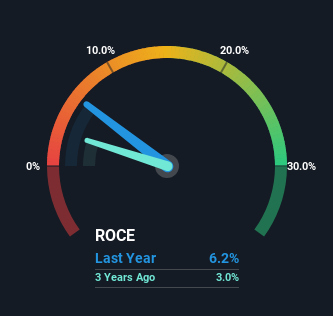- Saudi Arabia
- /
- Consumer Services
- /
- SASE:4290
Returns On Capital Signal Tricky Times Ahead For Al Khaleej Training and Education (TADAWUL:4290)
To find a multi-bagger stock, what are the underlying trends we should look for in a business? In a perfect world, we'd like to see a company investing more capital into its business and ideally the returns earned from that capital are also increasing. This shows us that it's a compounding machine, able to continually reinvest its earnings back into the business and generate higher returns. However, after briefly looking over the numbers, we don't think Al Khaleej Training and Education (TADAWUL:4290) has the makings of a multi-bagger going forward, but let's have a look at why that may be.
Understanding Return On Capital Employed (ROCE)
If you haven't worked with ROCE before, it measures the 'return' (pre-tax profit) a company generates from capital employed in its business. To calculate this metric for Al Khaleej Training and Education, this is the formula:
Return on Capital Employed = Earnings Before Interest and Tax (EBIT) ÷ (Total Assets - Current Liabilities)
0.062 = ر.س89m ÷ (ر.س1.9b - ر.س511m) (Based on the trailing twelve months to September 2023).
Therefore, Al Khaleej Training and Education has an ROCE of 6.2%. Ultimately, that's a low return and it under-performs the Consumer Services industry average of 9.3%.
View our latest analysis for Al Khaleej Training and Education

Historical performance is a great place to start when researching a stock so above you can see the gauge for Al Khaleej Training and Education's ROCE against it's prior returns. If you want to delve into the historical earnings , check out these free graphs detailing revenue and cash flow performance of Al Khaleej Training and Education.
So How Is Al Khaleej Training and Education's ROCE Trending?
When we looked at the ROCE trend at Al Khaleej Training and Education, we didn't gain much confidence. To be more specific, ROCE has fallen from 8.2% over the last five years. However it looks like Al Khaleej Training and Education might be reinvesting for long term growth because while capital employed has increased, the company's sales haven't changed much in the last 12 months. It may take some time before the company starts to see any change in earnings from these investments.
On a related note, Al Khaleej Training and Education has decreased its current liabilities to 26% of total assets. That could partly explain why the ROCE has dropped. Effectively this means their suppliers or short-term creditors are funding less of the business, which reduces some elements of risk. Since the business is basically funding more of its operations with it's own money, you could argue this has made the business less efficient at generating ROCE.
The Key Takeaway
To conclude, we've found that Al Khaleej Training and Education is reinvesting in the business, but returns have been falling. Yet to long term shareholders the stock has gifted them an incredible 208% return in the last five years, so the market appears to be rosy about its future. But if the trajectory of these underlying trends continue, we think the likelihood of it being a multi-bagger from here isn't high.
On a final note, we've found 2 warning signs for Al Khaleej Training and Education that we think you should be aware of.
For those who like to invest in solid companies, check out this free list of companies with solid balance sheets and high returns on equity.
New: Manage All Your Stock Portfolios in One Place
We've created the ultimate portfolio companion for stock investors, and it's free.
• Connect an unlimited number of Portfolios and see your total in one currency
• Be alerted to new Warning Signs or Risks via email or mobile
• Track the Fair Value of your stocks
Have feedback on this article? Concerned about the content? Get in touch with us directly. Alternatively, email editorial-team (at) simplywallst.com.
This article by Simply Wall St is general in nature. We provide commentary based on historical data and analyst forecasts only using an unbiased methodology and our articles are not intended to be financial advice. It does not constitute a recommendation to buy or sell any stock, and does not take account of your objectives, or your financial situation. We aim to bring you long-term focused analysis driven by fundamental data. Note that our analysis may not factor in the latest price-sensitive company announcements or qualitative material. Simply Wall St has no position in any stocks mentioned.
About SASE:4290
Al Khaleej Training and Education
Operates schools for primary and secondary education with an international curriculum in Kingdom of Saudi Arabia, Other Gulf Cooperation Council countries, and internationally.
Slight risk and slightly overvalued.
Similar Companies
Market Insights
Community Narratives



